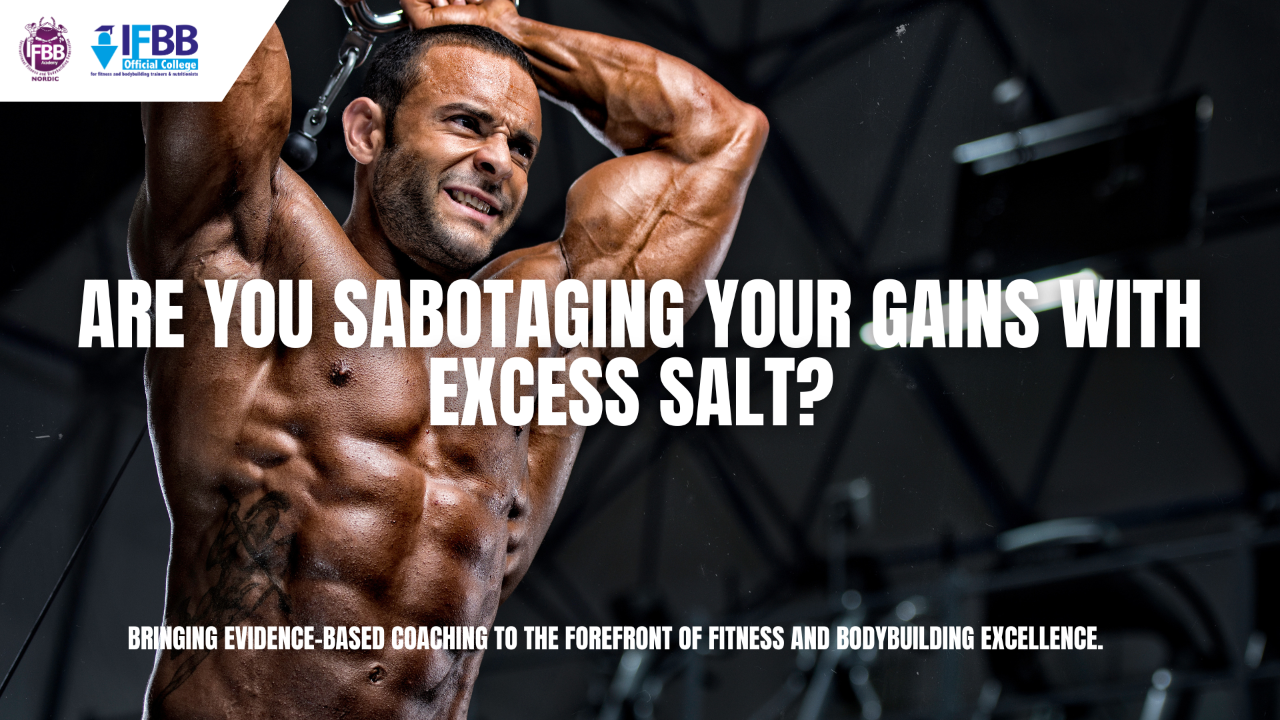Are You Sabotaging Your Gains with Excess Salt?
Mar 15, 2025
In the relentless pursuit of the perfect physique, bodybuilders often employ a myriad of dietary strategies. One persistent, yet controversial, practice is the intentional consumption of high amounts of salt. The belief is that extra sodium enhances the "pump," improves hydration, and somehow magically leads to greater muscle fullness and fat loss. But does the science support this salty strategy, or is it a misguided tradition that could be hindering your progress, and possibly even your health? This blog post, informed by a review of peer-reviewed scientific literature, dives deep into the sodium debate, separating fact from fiction for the physique-conscious athlete.
The Essential Role of Sodium (But How Much is Too Much?)
Sodium isn't the enemy. It's an essential electrolyte, crucial for:
- Fluid Balance: Regulating the delicate balance of fluids inside and outside your cells.
- Nerve Impulses: Transmitting signals between your brain and muscles.
- Muscle Contractions: Enabling the very movements that build your physique.
- Blood Volume and Pressure: Maintaining cardiovascular function and nutrient delivery.
However, the key is balance. While we need sodium, most people, including athletes, consume far more than necessary. The World Health Organization (WHO) recommends less than 5 grams of salt (about 2 grams of sodium) per day (Jachimowicz-Rogowska & Winiarska-Mieczan, 2023). Yet, average global consumption is often double that, around 9-12 grams of salt per day (Kwong et al., 2022; He et al., 2010).
The Myth of the "Salty Pump" and Muscle Growth
The idea that loading up on salt leads to bigger, fuller muscles is largely anecdotal. While sodium does play a role in muscle contractions and maintaining cell volume (which can indirectly influence protein synthesis), there's no strong evidence that consuming excess sodium boosts muscle hypertrophy beyond what adequate intake provides.
In fact, some research suggests the opposite. Studies in older adults have linked higher salt intake to reduced muscle strength and physical performance (Lu et al., 2023; Yoshida et al., 2020). While these studies focused on older populations, they raise concerns about the long-term effects of chronically high sodium intake on muscle function. There is some research that shows positive correlation between dietary salt intake and fat-free mass (Nikpey et al., 2019), but more evidence is needed, because there are no direct evidence, that it helps muscles to hypertrophy.
Salt and Fat Loss: A Counterproductive Combination?
If your goal is a shredded physique, excess salt might be working against you. A substantial body of evidence links high sodium intake to increased risk of obesity and body fat (Zhang et al., 2018; He et al., 2015; Ma et al., 2022). One study found that each 1-gram increase in daily sodium intake was associated with a 15% higher risk of obesity and a 24% higher risk of central obesity (Zhang et al., 2018).
How does this happen? High salt intake can increase thirst, leading to greater consumption of sugary drinks, which are notorious contributors to weight gain (Zhang et al., 2018). Furthermore, some research suggests that high sodium intake can disrupt metabolic processes, potentially contributing to insulin resistance and fat accumulation (Veniamakis et al., 2022).
It's crucial to understand that any initial weight loss seen with sodium reduction is primarily due to water loss, not fat loss (Kim et al., 2014). While manipulating water balance can be a short-term strategy for "peak week", it's not a sustainable or healthy approach to fat loss.
Peak Week: Strategic Sodium Manipulation (with Caution!)
The one area where sodium manipulation might have a place is during the final week before a competition ("peak week"). Bodybuilders often drastically reduce sodium intake, combined with water manipulation, to achieve a "dry" and defined look (Chappell & Simper, 2018; Barakat et al., 2022).
However, this practice is controversial and potentially risky. Extreme sodium depletion can trigger the release of aldosterone, a hormone that promotes sodium and water retention, defeating the purpose (Mitchell et al., 2017). It can also lead to a decrease in blood pressure, impacting the "pump" and even causing dizziness.
Emerging research suggests that a more consistent approach to sodium and water intake throughout peak week might be more effective and safer. A slight increase in sodium, coupled with adequate hydration, shortly before stepping on stage, might help achieve muscle fullness without the "spillover" effect (Barakat et al. 2022).
Sodium and Exercise Performance: The Hydration Connection
Sodium's role in hydration is undeniable. During exercise, especially prolonged or intense activity, we lose sodium through sweat (Veniamakis et al., 2022). Replacing this lost sodium is crucial for maintaining fluid balance, preventing dehydration, and optimizing performance.
However, this doesn't mean you need to chug salt tablets. For most workouts under 90 minutes, plain water is sufficient (Radloff, 2025). For longer, more intense sessions, especially in hot conditions, electrolyte drinks containing sodium can be beneficial. The key is to match sodium intake to sodium losses, which vary greatly depending on individual sweat rates and environmental factors (Veniamakis et al., 2022).
The Health Risks of Chronic High Sodium Intake
Beyond its potential impact on physique goals, chronically high sodium intake carries significant health risks. It's a major contributor to high blood pressure (hypertension), a leading risk factor for heart disease and stroke (Hyseni et al., 2016; Nakamura & Miyoshi, 2019; He et al., 2021). High salt intake has also been linked to other health problems, including stomach cancer and kidney disease (Hyseni et al., 2016; Jachimowicz-Rogowska & Winiarska-Mieczan, 2023; He et al., 2010).
The Bottom Line: Evidence-Based Recommendations for Physique Athletes
Based on the scientific evidence, here's a practical, evidence-based approach to sodium for physique athletes:
- Prioritize Overall Health: Adhere to general healthy guidelines for sodium intake – less than 2300 mg per day (about one teaspoon of salt) – to minimize the risk of hypertension and other health problems.
- Ditch the "Salty Pump" Myth: Don't rely on high salt intake for muscle growth or fat loss. Focus on proven strategies: adequate protein, resistance training, and a balanced calorie-controlled diet.
- Rethink Peak Week: Avoid extreme sodium depletion. A more consistent approach, with potential slight increases shortly before the stage, might be more effective and safer.
- Hydrate Smart: Replace sodium losses during prolonged or intense training, especially in hot conditions, with electrolyte drinks if needed.
- Individualize: Sodium needs vary. Pay attention to your body and consider consulting with a registered dietitian or sports nutritionist for personalized guidance.
- Monitor: Because you are atleth and you will follow high protein diet, your kidney function and overall healt has to be monitored (He, F., Jenner, K., & MacGregor, G. (2010).
References
- Barakat, C., Escalante, G., Stevenson, S. W., Bradshaw, J. T., Barsuhn, A., Tinsley, G. M., & Walters, J. (2022). Can bodybuilding peak week manipulations favorably affect muscle size, subcutaneous thickness, and related body composition variables? A case study. Sports, 10(7), 106.
- Chappell, A. J., & Simper, T. N. (2018). Nutritional peak week and competition day strategies of competitive natural bodybuilders. Sports, 6(4), 126.
- Cobiac, L., Vos, T., & Veerman, J. (2010). Cost-effectiveness of interventions to reduce dietary salt intake. Heart, 96, 1920 - 1925.
https://doi.org/10.1136/hrt.2010.199240 - GSSI. (2024). Dietary Water and Sodium Requirements For Active Adults. Retrieved from
https://www.gssiweb.org/sports-science-exchange/article/sse-92-dietary-water-and-sodium-requirements-for-active-adults - He, F., Jenner, K., & MacGregor, G. (2010). WASH-world action on salt and health.. Kidney international, 78 8, 745-53.
https://doi.org/10.1038/ki.2010.280 - He, F., Campbell, N., Woodward, M., & MacGregor, G. (2021). Salt reduction to prevent hypertension: the reasons of the controversy.. European heart journal.
https://doi.org/10.1093/eurheartj/ehab274 - He, F. J., MacGregor, G. A., & Campbell, N. R. C. (2015). High Salt Intake. Independent Risk Factor for Obesity? American Heart Association Journals. Retrieved from
https://www.ahajournals.org/doi/10.1161/hypertensionaha.115.05948 - Hyseni, L., Elliot-Green, A., Lloyd-Williams, F., Kypridemos, C., O’Flaherty, M., McGill, R., Orton, L., Bromley, H., Cappuccio, F., & Capewell, S. (2016). Systematic review of dietary salt reduction policies: Evidence for an effectiveness hierarchy?. PLoS ONE, 12.
https://doi.org/10.1371/journal.pone.0177535 - InsideTracker. (2025). Hydration, Sodium, Potassium and Exercise: What You Need to Know. Retrieved from
https://www.insidetracker.com/a/articles/hydration-sodium-potassium-and-exercise - Iraki, J., Fitschen, P., Espinar, S., & Helms, E. (2019). Nutrition recommendations for bodybuilders in the off-season: A narrative review. Sports, 7(7), 154.
- Jachimowicz-Rogowska, K., & Winiarska-Mieczan, A. (2023). Initiatives to Reduce the Content of Sodium in Food Products and Meals and Improve the Population’s Health. Nutrients, 15.
https://doi.org/10.3390/nu15102393 - Kim, J. H., Moon, J. H., Kim, H. J., Kong, M. H., & Yoon, Y. H. (2014). Low salt and low calorie diet does not reduce more body fat than same calorie diet: a randomized controlled study. Oncotarget, 9(12), 10489-10498.
- Kwong, E., Whiting, S., Bunge, A., Leven, Y., Breda, J., Rakovac, I., Cappuccio, F., & Wickramasinghe, K. (2022). Population-level salt intake in the WHO European Region in 2022: a systematic review. Public Health Nutrition, 26, s6 - s19.
https://doi.org/10.1017/S136898002200218X - Lu, Y., Chen, C., Pan, A., He, M., Zhang, C., Liu, X., ... & Xu, T. (2023). Association of Salt Intake with Muscle Strength and Physical Performance in Middle-Aged to Older Chinese: The Guangzhou Biobank Cohort Study. Nutrients, 15(3), 516.
- Ma, Y., He, F. J., Sun, Q., Yuan, C., Kieneker, L. M., Curhan, G. C., ... & Hu, F. B. (2022). Causal associations between salt intake with body mass, shape and composition: A two-sample Mendelian randomization study. medRxiv.
- Mitchell, L., Hackett, D., Gifford, J., Estermann, F., & O’connor, H. (2017). Do bodybuilders use evidence-based nutrition strategies to manipulate physique?. Sports, 5(4), 76.
- Nakamura, K., & Miyoshi, T. (2019). The optimal amount of salt intake. Hypertension Research, 42, 752-753. https://doi.org/10.1038/s41440-019-0225-7
- Nikpey, L., Jafari, A., Feizi, A., Ghasemi, A., & Afshari, A. (2019). High salt diets in young university adults and the correlation with blood pressure, protein intake and fat free mass. BioHorizons, 2(1), 16-21.
- Veniamakis, E., Kaplanis, G., Voulgaris, P., & Nikolaidis, P. T. (2022). Effects of Sodium Intake on Health and Performance in Endurance and Ultra-Endurance Sports. International Journal of Environmental Research and Public Health, 19(6), 3651.
- Yoshida, M., Takahashi, Y., Ushigome, E., & Koyama, T. (2020). High Salt Diet Impacts the Risk of Sarcopenia Associated with Reduction of Skeletal Muscle Performance in the Japanese Population. Journal of Nutritional Science and Vitaminology, 66(5), 391-397.
- Zhang, Z., Cogswell, M. E., Gillespie, C., Fang, J., Loustalot, F., & Dai, S. (2018). A Positive Association Between Dietary Sodium Intake and Obesity and Central Obesity: Results from the National Health and Nutrition Examination Survey. Journal of the Academy of Nutrition and Dietetics, 118(8), 1459-1466.e2.
Ready to take your coaching skills to the elite level? Join the IFBB Master Coach Program and gain the knowledge, techniques, and confidence to coach athletes to success. Don’t miss this chance to learn from world-renowned experts and earn a globally recognized certification! Enroll today and unlock your full potential as a Master Coach.
Stay connected with news and updates!
Join our mailing list to receive the latest news and updates from our team.
Don't worry, your information will not be shared.
We hate SPAM. We will never sell your information, for any reason.
